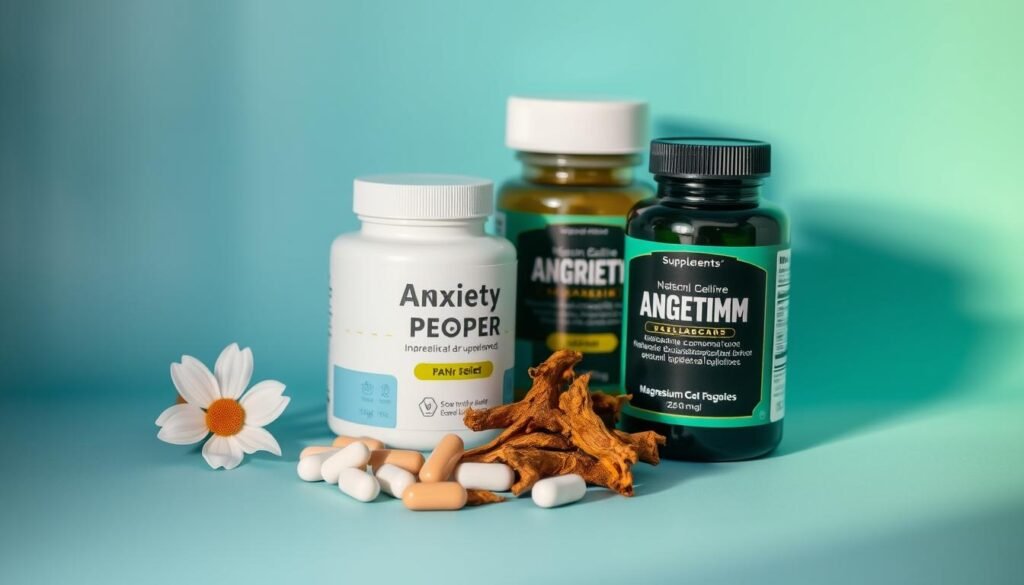About 40 million adults in the U.S. struggle with anxiety. It’s a top mental health issue. This big number shows we need good solutions fast. While therapy and medicine are common choices, many are considering supplements for anxiety relief. These natural options might help reduce symptoms and boost well-being.
More studies are showing the perks of certain dietary supplements for anxiety. It’s important to see how they can fit into your anxiety care plan. This piece will delve into anxiety-relief supplements, focusing on how they can aid your efforts. We want to give you the info you need on natural remedies. This guide is here to help those looking for effective ways to handle anxiety.
Key Takeaways
- Anxiety disorders impact around 40 million adults in the U.S.
- Supplements can serve as valuable tools in anxiety management.
- Natural anxiety remedies may complement traditional treatments.
- Understanding the various supplements helps in making informed decisions.
- Consulting a healthcare professional is crucial before starting any supplements.
Understanding Anxiety and Its Impact
Anxiety disorders are a significant challenge for many. By understanding them, we can highlight their importance. It’s essential to grasp what anxiety disorders are, their symptoms, and their impact in the U.S.
Definition of Anxiety Disorders
Anxiety disorders include various mental health issues marked by fear or worry. They can range from simple stress to severe disorders like GAD, Social Anxiety, and OCD. Knowing about these disorders helps us see how they influence daily life.
Common Symptoms of Anxiety
Symptoms of anxiety can disrupt well-being and daily activities. They manifest as:
- Excessive worry about different life aspects
- A feeling of restlessness or being edgy
- Physical symptoms like a faster heartbeat, sweating, or shaking
- Problems focusing because of ongoing thoughts
- Trouble sleeping, including insomnia
Spotting these signs early helps with timely help and solutions.
Statistics on Anxiety Prevalence in the U.S.
Recent stats show anxiety disorders top mental health issues in the U.S. They affect about 44% of adults, or over 113 million people. This highlights the need for effective ways to manage anxiety, including lifestyle changes and possibly supplements.
Behavior and Lifestyle Changes to Reduce Anxiety
Changing your behavior and lifestyle can greatly help manage anxiety. Adding regular exercise and choosing what you eat carefully are key steps. Exercise and a good diet are important for your mental health.
Importance of Regular Exercise
Regular exercise is a strong way to fight anxiety. A study in 2021 found that active people are 60% less likely to have anxiety. Endorphins released during exercise make you feel better.
Exercise also helps you sleep well, which is crucial for handling anxiety. If sleep is hard, try to get at least 7 hours, says the CDC. Not sleeping enough can make anxiety worse.
Dietary Tips and Nutritional Support
Eating right is essential for mental health. Foods full of vitamins and minerals help with anxiety. Here are some tips:
- Eat omega-3 rich foods like salmon and walnuts to lower anxiety.
- Add magnesium-rich foods, like leafy greens and grains, to your diet.
- Choose herbal teas or water over coffee and energy drinks to avoid anxiety spikes.
- Drink less alcohol, as it can link to anxiety issues.
- Get enough vitamin D from the sun or fortified foods for better mood.

Making these changes can greatly improve your mental health and lower anxiety. It’s all about taking care of your body and mind.
How Supplements Help Calm Anxiety
Supplements play a key role in managing anxiety. They provide specific nutrients that help ease anxiety symptoms. Many studies show how certain supplements improve mental health. They offer hope to those struggling with anxiety.
Scientific Evidence Supporting the Use of Supplements
Research shows that vitamins and minerals are crucial for mental health. For example, over a third of Americans lack enough Vitamin D, which affects mood. A study found that taking 1600 IU of Vitamin D for six months improved mood and lowered anxiety. This supports the use of supplements for better handling of anxiety symptoms.
Essential Nutrients for Anxiety Management
Key nutrients are vital for emotional balance and brain function. Up to half of Americans don’t get enough magnesium, important for anxiety management. Cooper Complete offers a product, Magnesium Glycinate, that’s effective for brain neurotransmitter activity. Plus, B vitamins like thiamine and riboflavin are needed for neurotransmitter production, aiding in anxiety reduction. The synthesis of these key nutrients, as found here, highlights their role in comprehensive mental health care.
Popular Anxiety Relief Supplements
Many people look for ways to ease their anxiety. They often turn to supplements. Vitamin D is a key player in managing mood. A lot of people in the U.S. don’t get enough Vitamin D. This lack might be linked to anxiety. Adding this vitamin to your diet could help your mind feel better. But it’s key to know how it affects anxiety symptoms.
Vitamin D and Its Role in Mood Regulation
Vitamin D is closely tied to mental wellness. Not having enough can lead to mood issues, like anxiety. Getting enough Vitamin D might help with anxiety. Eating foods with Vitamin D and getting some sun can help manage moods better.
Magnesium for Anxiety Support
Magnesium is another top choice for easing anxiety. It helps calm the nervous system and lowers stress hormones. Many people don’t get enough magnesium, though only half reach the daily needed amount. Adding foods or supplements with magnesium can really help with anxiety.
B Vitamins and Their Connection to Mental Health
B vitamins play a big part in keeping our minds healthy. They can really affect anxiety. B6, B12, and thiamine, in particular, help reduce anxiety symptoms. B vitamins are closely linked to mental health. Not getting enough can make anxiety and stress worse. A study found that eating more riboflavin (B2) can lower the chance of feeling depressed or anxious. So, these vitamins are vital for anyone fighting anxiety.

Herbal Anti-Anxiety Aids
Herbal anti-anxiety aids are becoming more popular as natural options. They promise to help with anxiety with fewer side effects. These aids have deep roots in traditional medicine.
Valerian Root and Its Calming Effects
Valerian root is known for its calming effects. It may lower anxiety and help with sleep. Its compounds work with the brain to help manage anxiety.
Lemon Balm: A Natural Remedy for Anxiety
Lemon balm can also reduce anxiety. Taking 1,000 to 1,500 mg can help. It makes you calmer and improves sleep, boosting overall health.
Ashwagandha and Its Adaptogenic Properties
Ashwagandha is known for its stress-managing effects. Taking 1 mL two or three times a day can make a big difference. It can improve sleep and lower anxiety, boosting energy.

Adding these herbs to your daily routine can be a natural way to deal with anxiety. But, talk to a doctor first, especially about mixing them with other medicines. For more on herbs and anxiety, check out this guide.
Stress-Reducing Vitamins to Consider
Managing stress and anxiety can greatly improve one’s well-being. Many vitamins and nutrients are key in this fight. Omega-3 for anxiety and L-theanine for relaxation are getting a lot of attention. They help a lot with mental health.
The Role of Omega-3 Fatty Acids in Reducing Anxiety
Omega-3 fatty acids, like DHA, are very important for the brain. Studies show they help reduce anxiety. A big review of 19 studies found that omega-3 can lower anxiety and stress hormones.
This has made omega-3 for anxiety quite popular. People are choosing it over traditional meds. This trend shows the growing role of vitamins in managing stress.
L-theanine for Relaxation and Stress Relief
L-theanine is an amino acid found in tea. It’s great for relaxation. Studies show it can reduce stress responses and stress hormones, all without making you sleepy.
About 200 mg of L-theanine can help with anxiety. This makes L-theanine a key player among stress vitamins. More people are using it as part of their natural approach to anxiety management.
Calming Mineral Supplements
Anxiety is common in the U.S., affecting around 44% of adults. Magnesium is one calming supplement that helps with anxiety. This section will talk about magnesium benefits and how multivitamins improve mental health.
Understanding the Benefits of Magnesium
Magnesium helps control our stress response, which lowers anxiety. Sadly, half of Americans don’t get enough magnesium. This might be why many feel anxious. Taking 248 milligrams of magnesium every day for six weeks improved depression and anxiety in a study. So, using supplements can help those who don’t get enough from food.
How Multivitamins Can Support Mental Health
Along with magnesium, multivitamins for mental health give you important nutrients for your mind. They help cover any nutritional shortfalls from what we eat or our lifestyle. B vitamins, in particular, support brain health and mood. They help us handle stress better. A daily multivitamin could make a big difference for those with anxiety.
Looking into supplements for anxiety? It’s best to talk to a healthcare provider. They can help find the right supplements for you safely.
Natural Remedies vs. Prescription Treatments
Exploring how to manage anxiety offers many paths, including natural and prescription options. People are curious about herbal remedies and supplements as alternatives to drugs. We’ll look at how supplements can work with medications to ease anxiety.
Complementary Nature of Supplements with Therapy
Natural remedies can support traditional treatments. For example, CBD oil and Omega-3 can reduce anxiety, adding to the benefits of conventional therapies. Lavender oil helps calm nerves, especially during stressful procedures like operations or chemotherapy sessions. Exercise is great too. It lowers anxiety after just one workout.
Consulting with Healthcare Professionals
Talking to health experts before starting supplements is key. Natural remedies might not mix well with certain medications. To avoid risks, discuss with a doctor to safely add natural treatments. For those wanting to learn more about this, check out information on natural remedies for anxiety.
| Treatment Type | Description | Research Support |
|---|---|---|
| CBD Products | May help lower anxiety levels. | Emerging research supports therapeutic benefits. |
| Lavender Essential Oil | Effective in reducing anxiety and depression symptoms. | 2017 literature review findings. |
| Chamomile Tea | Regular consumption can reduce GAD symptoms. | Study from 2016. |
| Exercise | Protects against anxiety symptoms. | 2019 meta-analysis results. |
| L-theanine | May lower anxiety levels under stress. | Positive outcomes in stressful situations. |
| Grounding Techniques | Connecting with the earth may improve mood. | Emerging studies suggest benefits. |
Conclusion
Anxiety and depression rates are on the rise, and finding ways to manage anxiety is crucial. Changing our lifestyles, diets, and taking certain supplements can help relieve anxiety. Research supports the use of magnesium and vitamin B3. These can improve stress tolerance and lessen anxiety.
Herbal supplements like ashwagandha and valerian root also play a role in combating anxiety naturally. With 55 million Americans struggling with these conditions, understanding these supplements is key. They offer positive effects and are helpful in an anxiety management routine.
Using these supplements with a doctor’s advice can offer a well-rounded approach to mental health. It’s important to work with healthcare providers for a plan that’s right for you. By checking out the summary of anxiety supplements and their benefits, people can take steps towards a balanced life and better manage their anxiety.